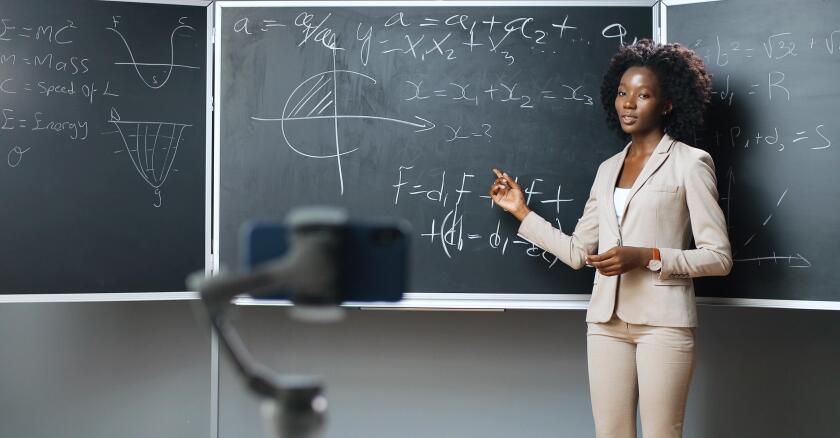"Teachers watching themselves and/or others teach is arguably one of the most powerful learning opportunities for teachers to grow in their practice," said Nick Lundberg, the Title I and special-programs coordinator for the 29,000-student district, who is managing the AI teacher-training initiative.
In fact, research shows that video-based training helps teachers meet their pedagogical goals. Other studies have also concluded that teachers should be able to see learning in their classrooms through the eyes of their students to help with their practice and to increase student achievement.
In a video interview with Education Week, Lundberg discussed how the AI technology from software company Edthena works for teachers and why the district decided to use it. The Edthena software is apparently the first of its kind, according to ed-tech experts.
To use the program, a teacher would upload a video of their classroom instruction onto the online platform, and from there the AI coach guides the teacher's analysis of their video. The AI coach asks the teacher for their teaching priorities and goals and then offers relevant guidance that will help them achieve those goals. In essence, the software is an AI version of an instructional coach.
This interview has been edited for brevity and clarity.
Why did the district decide to use an AI coach?
The problem we are trying to solve is this: Our teachers are doing a lot of work to meet school and district initiatives, curriculum implementation, and build equity in their classroom as they strive to meet the diverse needs of each student. In schools that have instructional coaches, our coaches can't provide the same level of feedback that an AI coach can give for all teachers within the school year, so the AI enhances their work and extends their capacity to work with many more teachers. We also have many schools that do not have instructional coaches. The AI coach allows us to provide opportunities to all our teachers to reflect on their practice in an authentic way.
How would a teacher use an AI coach?
The first thing you do is select what goals you want to work on. Then you upload a video, and the technology walks you through the reflection process based on your goals. For example, if I select differentiation as a goal, it's going to give me some clues or something to look for in my video. For some teachers, they may see something new in their teaching that they haven't seen as far as what differentiation is. Then, you will be asked to reflect on your strengths and areas of growth and, then, you develop an action plan. It holds me accountable and asks me for another reflection after I've implemented the action plan.
Are the suggestions from the AI coach based on the district's instructional framework?
They're more like if-then statements. So if I say this, it's going to give me some prebuilt responses. They're continuing to upgrade the platform, and one of the feedback items that we mentioned so far is we asked if we could tie in our instructional framework. It would be nice if the strategies and goals teachers select are tied to the instructional framework we use in our district.
What's the feedback from teachers so far?
We're just starting to bring this online for our district, and so right now, it's an open invitation for teachers. Nothing is required—it's wrapped up in a professional-development course that teachers can access on their own.
So far, it's received very positive feedback. What it's really done for teachers is allowed them flexibility to reflect on their teaching on their own time. I don't have to do it all in one sitting, which you would have to do with a human.
Over the last few years, we haven't done much with peer observation and video self-reflection, so we're kind of getting back into that idea. What I'm hoping is that this opens the door for teachers to not only start sharing with each other what they're learning from their reflection but also that this opens the door to more video coaching or video sharing among teachers.
What's next for the district with this technology?
So far, we've had about 30 teachers use the program over the last couple of months during our trial period. We are in the planning stages for the next school year to support a couple of elementary schools interested in adopting this as part of their school improvement plan and to continue to offer it as an asynchronous districtwide professional-development course for all interested teachers.
There's not just one way to use this platform. For example, we've considered using this as part of our instructor process. Our facilitators who are delivering PD, they should be going through the AI coach as well.
© 2023 Education Week (Bethesda, Md.). Distributed by Tribune Content Agency, LLC.















